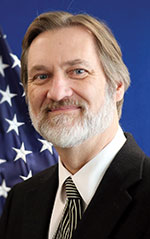Why the State Department Needs an Office of Diplomatic Gaming
Speaking Out
BY ROBERT DOMAINGUE
Speaking Out is the Journal’s opinion forum, a place for lively discussion of issues affecting the U.S. Foreign Service and American diplomacy. The views expressed are those of the author; their publication here does not imply endorsement by the American Foreign Service Association. Responses are welcome; send them to journal@afsa.org.
Serious games, also known as decision or policy games, are used by many different organizations to deal with complex problems. They can be used to promote strategic thinking, conduct analysis, perform training, and advance diplomatic goals.
The Department of Defense (DoD) and the intelligence community (IC) routinely use games to examine assumptions, test concepts, and explore alternative courses of action. The Department of State, however, is lagging far behind in the use of policy gaming, and this hinders the department’s ability to proactively engage on issues rather than reacting to them as they occur.
There is no centralized office at State devoted to supporting the use of gaming to enhance decision-making. Various offices have used tabletop exercises (TTX) to explore important issues, but they have relied on DoD and IC designers to create and run the exercises. State needs a dedicated office with the capacity to design, facilitate, and utilize its own policy games, but it does not have one.
This was not always the case. The Foreign Service Institute’s Office of Special Programs, headed by Fred Hill from 1986 to 2006, advanced some of these capabilities. It developed high-level policy games on such topics as the possible collapse of the Soviet Union, transitions in various governments, potential war between countries, nuclear programs in specific countries, and conflicts in different regions. But the FSI office closed in 2007, and the State Department never replaced it.
Hence, this proposal.
Structure and Staffing
The new Office of Diplomatic Gaming needs to be located where it is seen as serving the entire department. However broad-minded bureau leadership may be, parochial interests inevitably arise, and the larger departmentwide mandate is often subsumed to more immediate local interests (as happened to the FSI Office of Special Programs). To avoid this fate, the new office should be located under the Secretary (S) and organized to support small teams of serious game designers within each bureau.
The centralized office would provide training (train-the-trainer) and design advice to the bureau teams who, in turn, support the offices within the bureaus. Expertise will be developed at both the office level (and in embassies) and at higher levels. Capacity for designing and utilizing decision games will eventually be spread throughout the entire department.
Like generals preparing for war, senior diplomats can take advantage of policy games to examine alternative decisions and the consequences of those decisions.
Like the best offices at State, the Office of Diplomatic Gaming will take advantage of the diverse talents represented by different categories of employees. Civil Service staff will provide the core continuity in the office, while Foreign Service and political appointees provide their unique experiences. Important expertise will come from serious game designers detailed from the war colleges and the intelligence community.
Another important source of expertise for the office could come from the Pentagon’s Joint Staff J8 Studies, Analysis, and Game Division (SAGD), which has run a number of games for the State Department. To build knowledge and experience, it would be appropriate to also have State Department staff detailed to the wargaming offices of the war colleges, Pentagon, and other organizations.
Serving Multiple Functions
The Office of Diplomatic Gaming will serve multiple functions. Like the former FSI office, it will design and run games on issues for the highest levels of the department. These policy games will examine the thorniest issues confronting the United States and its partners, and allow senior leaders to experiment with different approaches to addressing them.
Like generals preparing for war, senior diplomats can take advantage of policy games to examine alternative decisions and the consequences of those decisions. Serious games are not just tools for senior leaders, however. They have a role to play at every level of the organization. Whenever a new technology is implemented or a plan developed, serious games can be used to test the rollout or find gaps within the plan.
Matrix games are argument-based seminar games that are ideally suited to these kinds of issues. They work with small groups (ideally 6-8 people), can cover a wide range of subjects, and can be developed very quickly. Establishing the use of Matrix games is one of the quickest ways to spread the adoption of serious games throughout the department.
The Office of Diplomatic Gaming will also be a one-stop-shop for other organizations seeking State Department participation in their games. DoD often seeks State Department participation in their wargames, but because there is currently no centralized office to field such a request DoD has to rely on personal acquaintances at State.
As a result, many DoD games proceed without any State Department input, which hurts both State and DoD. Greater State Department participation in wargames (which include pol-mil, gray zone, malign influence, and competition games) will enhance the quality of those games and also spread knowledge of the value of the games within the State Department.
To date, the State Department has relied on expertise from outside organizations, and the new Office of Diplomatic Gaming should continue to deepen those relationships. The National Defense University’s wargaming office (CASL) has provided training and consulting advice to department staff, and the office has created a new Wargaming Fellow Program that trains Foreign Service officers in the design and facilitation of serious games.
Many DoD games proceed without any State Department input, which hurts both State and DoD.
State Department staff have also participated in the Naval War College’s Wargame Design course. Likewise, staff have participated in the Air Force’s Advanced Wargaming course. The Army Command and General Staff College at Fort Leavenworth is the only school offering a master’s degree in wargame design. Foreign Service officers have gone through this program in the past, and we need more Foreign Service and Civil Service graduates of the program in the State Department.
There are numerous other possibilities for training staff in the use of serious games. These opportunities need to be shared more widely throughout the department.
Achieving Diplomatic Goals
Games can be used to achieve diplomatic goals. This application is underdeveloped, but it has great potential. How does it work?
One might, for example, teach serious game design (Matrix game design would be ideal) to diplomats from a collection of small countries that suffer aggression from a larger neighboring country. The diplomats would learn to design and facilitate decision games that experiment with different approaches to addressing the aggression and developing countermeasures that build resilience to that aggression in their countries.
This network of smaller countries could share ideas on game design among themselves, which might lead to cooperation in other areas. In this way, game design helps build resistance to authoritarian aggression.
Another example could be working with close partners to design a board game dealing with malign influence in a fictional country. Though the country in the game is fictional, the techniques used by malign actors are real. The game could educate a general population (or be used in specialized workshops) about manipulation techniques. Research has shown that this type of “inoculation” can build greater resilience in communities.
Serious games have an additional beneficial quality: They bring together experts from different backgrounds and promote collaboration across bureaucratic boundaries. The need for this is highlighted in the whole-of-government efforts to address, for instance, climate change or pandemics, where gaming is an essential tool to deal with the complexity of the phenomenon.
Take Climate Change, for Instance
The Pentagon’s SAGD ran an interagency climate change game called “Elliptic Thunder” that examined the security considerations of climate-driven extreme events. The game found important gaps in policies, authorities, and organizational abilities to deal with the new threats. The game also highlighted the critical role of effective diplomacy and strategic messaging.
At State, efforts have been made to create working-level linkages to deal with climate change that cut across bureaucratic boundaries. The Gaming Climate Change Network is one example. The number of climate change–related problems that must be gamed is enormous, and includes such things as the impacts on State Department operations, emerging conflicts, disruption of trade networks, migration flows, and food security.
For instance, what will the State Department do if a small country or nonstate entity begins geoengineering atmospheric cooling (high-altitude aerosols)? It is better to game that situation now, rather than wait to react to events.
Gaming is the tool of choice when facing uncertainty, and the State Department needs an office that can coordinate and build capacity for using this tool.
When sharing or linking to FSJ articles online, which we welcome and encourage, please be sure to cite the magazine (The Foreign Service Journal) and the month and year of publication. Please check the permissions page for further details.
Read More...
- “Practice Negotiation Skills Through Diplomatic Simulation Anywhere in Hungary,” U.S. Embassy Budapest, August 2022
- “Cultivating breakthrough thinking in serious games” by Robert Domaingue, PAXsims, April 2022
- “Robert Domaingue on State Department Gaming,” Beyond Solitaire Podcast, September 2020




